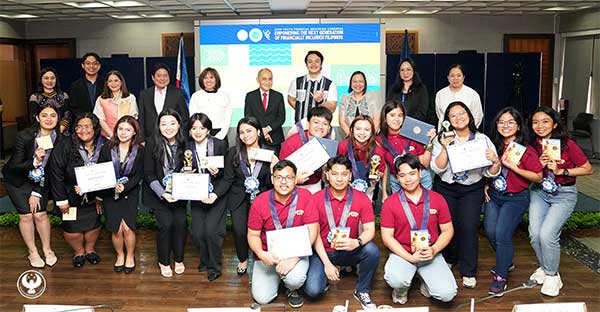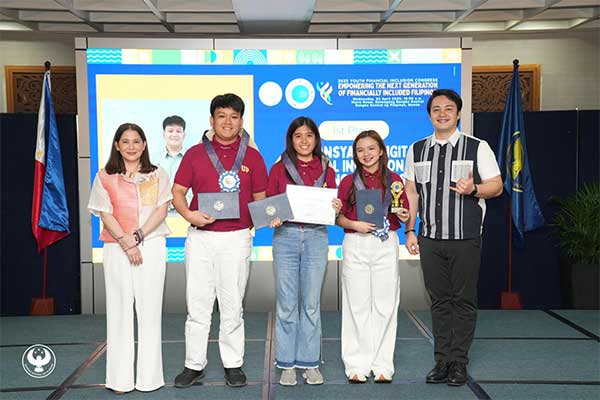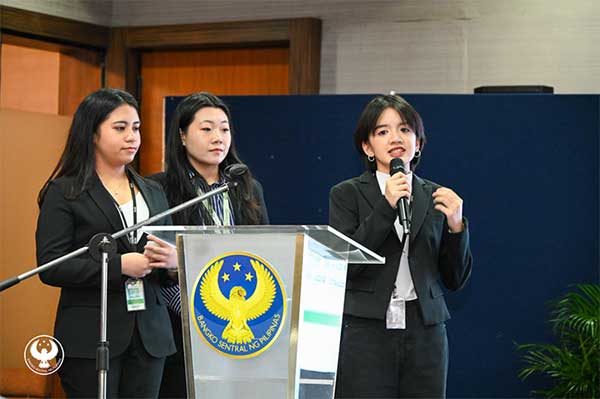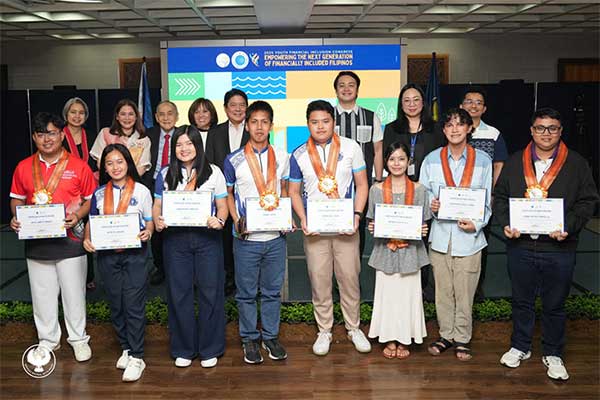
Young Filipino leaders and students from across the country gathered on April 2 at the Bangko Sentral ng Pilipinas (BSP) headquarters for the 2025 Youth Financial Inclusion (YFI) Congress, presenting innovative proposals to advance financial inclusion and digital financial health in the Philippines.
The one-day event spotlighted the YFI Hackathon, a competition where student groups pitched policies, programs, and community-based solutions designed to close the financial access gap through technology.
Winning top honors was the Polytechnic University of the Philippines (PUP) Manila team, “PUP PentAgila,” with their proposal “AniKansya,” a digital platform tailored for Filipino farmers to access financial products and services.
Team members Caitlin Faith Hashimoto, Marjorie Cabato, and Bart Patrick Familar emphasized that farmers remain one of the most financially underserved sectors in the country and need easier access to tools like loans, savings, and insurance.
“AniKansya aims to equip farmers with the means to secure their livelihood and plan for their future,” Hashimoto said during the team’s presentation.
The platform is designed to streamline access to credit, cooperatives, and agritech services through a farmer-friendly interface, using mobile technology to overcome geographic and literacy barriers.
BSP Deputy Governor Bernadette Romulo-Puyat opened the event by calling on the youth to take an active role in promoting financial empowerment.
“Be the ones who bridge gaps. Be the ones who teach, advocate, and inspire. Help your families and communities budget, save, invest, and grow,” she said in her keynote remarks.
Romulo-Puyat highlighted the critical role of youth in building a financial ecosystem that is both inclusive and resilient, particularly as the Philippines continues to digitalize its economy.
She noted that digital solutions, like mobile wallets and online banking, have already made strides in reaching unbanked populations, but grassroots participation remains key to long-term progress.

Meanwhile, National Youth Commission (NYC) Chairperson Joseph Francisco “Jeff” Ortega expressed his support for the program, saying, “We want to see more students and groups proposing their solutions to the problems that we have in the Philippines today.”
Hackathon awardees also included the following:
- (2nd Place) “PURSE,” a platform providing accessible financial services, receipt organization software, and digital cards for persons with disabilities, by Cyber Archers team from the De La Salle University composed of Daphne Loo, John Ray Cardeno, Shaina Julao, and Shekinah Marquez.
- (3rd Place) “SMS Fraud Checker,” an AI-powered feature that detects and warns users of potential scam texts in real-time by team Patch from the Ateneo de Manila University and University of the Philippines composed of Azzedine Abrencillo, Gabrielle Dotado, Jan Llenzl Dagohoy, and Angelica Marie Casuela.
- (4th Place) “MigoPay” a solar-powered, offline-capable fintech solution for Cebu’s fisherfolk using contactless tap-to-pay by Junquera Tech Solutions team from the University of San Carlos composed of Juliana Marie Mabugat, Kameron Zoe Cameron, Rose Ann Gesta, Katrina Bianca Tacandong, and Janica Marie Ycong.
- (5th Place) “TeknOffline,” a near-field communication enabled e-wallet for digital transactions in areas with weak or no internet access by JVFC Malaya from the PUP Manila composed of Jayson Santiago, Jose Manuel Lapesora, Csean Chloe Olleta, Frederick Gabriel Ramos, and Veniz Velasquez.

The Hackathon was co-chaired by BSP Monetary Board Members Romeo Bernardo, Rosalia De Leon, and Jose Querubin with NYC Chairperson Ortega. Officials from the Department of Trade and Industry, Department of Budget and Management, Department of Information and Communications Technology, National Economic and Development Authority, and the Presidential Communications Office comprised the panel.
The second highlight of the program was the launch of the first cohort of the YFI Ambassadors. They were selected for their dedication in promoting financial inclusion and improving financial health in their communities.
The YFI Ambassadors representing Luzon, Visayas, and Mindanao, submitted action plans for implementation that included promoting the use of digital payments within campuses, holding financial literacy seminars, and developing apps to help students in saving, budgeting, and managing their finances.
The YFI Ambassadors are:
- Relvic Amiel Murillofrom Cavite State University;
- Juana Marie Amplayo, Khane Dulfo, Jefferson Itaok, and Jaycel Lansangfrom Southern Leyte State University; and
- Zean Ernest Ross Sarda, Maydelyn Que Lolo, and Kenny Floyd Montelijafrom University of Southern Mindanao.

The 2025 YFI Congress is the culminating activity of the YFI Initiative, which was launched in January this year.
Aligned with the National Strategy for Financial Inclusion 2022-2028, the goal of the YFI initiative is to broaden inclusion and engagement with the youth sector and build a new generation of financially capable Filipinos. The YFI initiative seeks to recognize the youth’s potential to drive innovation and inclusive growth.


















